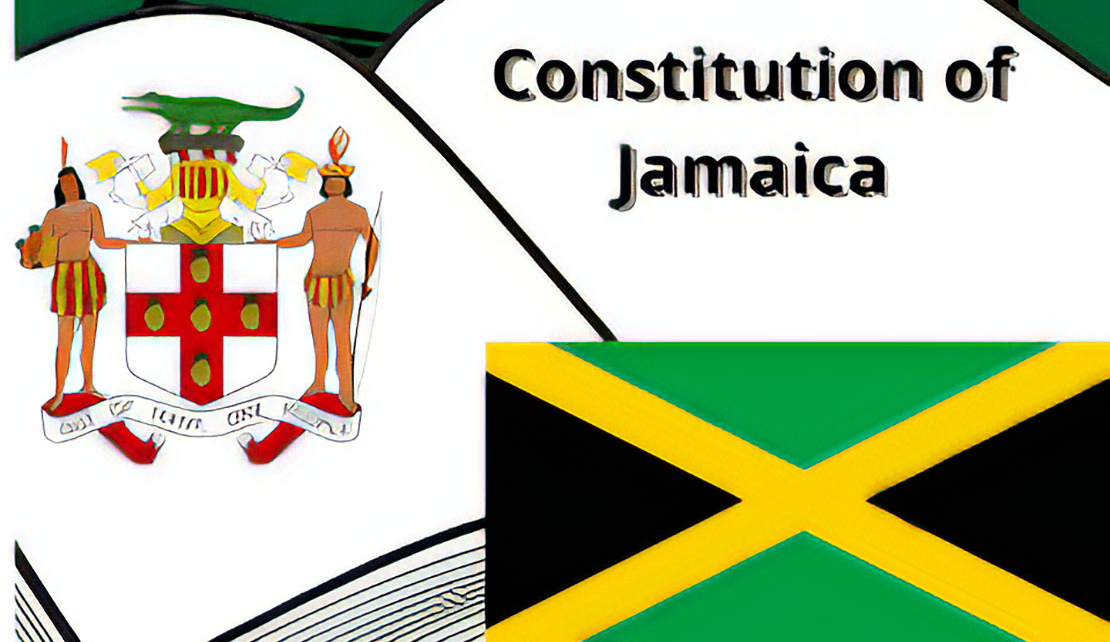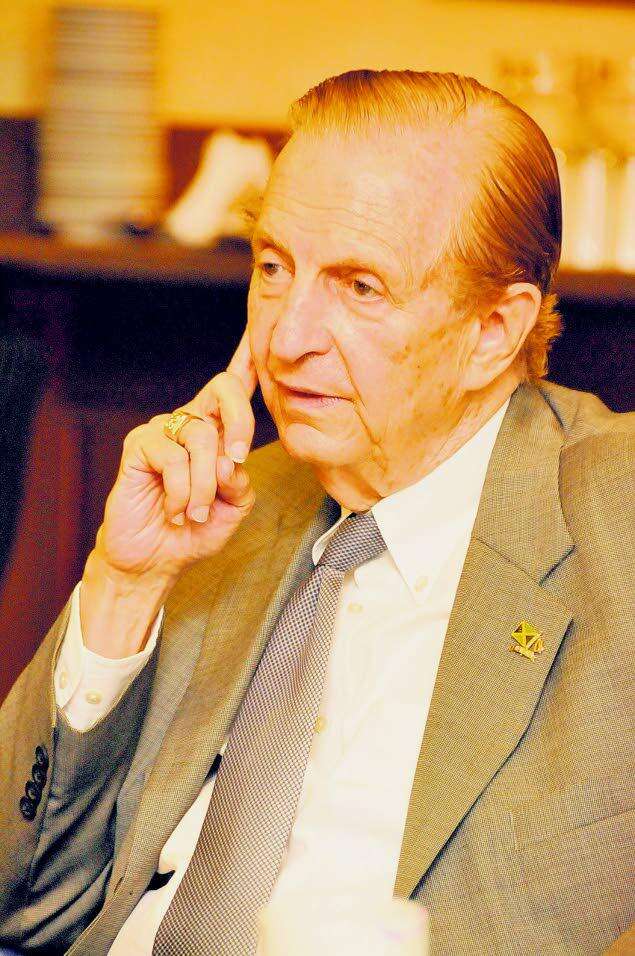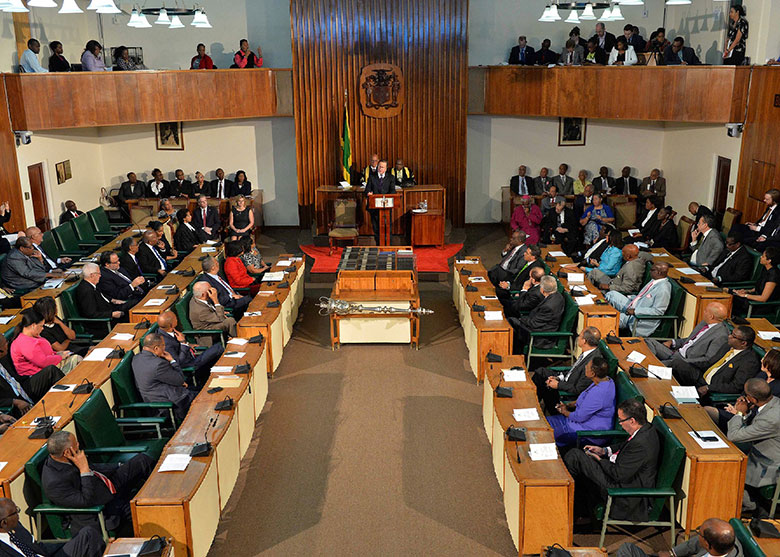JAMAICA | The Jamaica Labour Party (JLP) and the Constitution - Too Many Violations.

KINGSTON, Jamaica August 13, 2023 - Justice Minister Delroy Chuck's recent imperious manner in the House of Representatives in piloting an amendment to the foundation rules by which the society is governed was merely a follow-on from the open disrespect that the Jamaica Labour Party leadership has shown toward the Constitution and the rule of law during the past twenty years.
 A series of violations has flowed from their perfidious approach to the Constitution, too often to the detriment of the less privileged and their interests. And, surely, it cannot be smugly dismissed that a link exists between that reckless example displayed by a segment of the authorities towards the laws of Jamaica, and the undignified interaction that reigns right across the board.
A series of violations has flowed from their perfidious approach to the Constitution, too often to the detriment of the less privileged and their interests. And, surely, it cannot be smugly dismissed that a link exists between that reckless example displayed by a segment of the authorities towards the laws of Jamaica, and the undignified interaction that reigns right across the board.
The starting point was in 2003, late in Edward Seaga's leadership, with a precipitous downward trajectory set in motion after the Privy Council declared that, for transition to the Caribbean Court of Justice, the constitutional route was by means of a consensus vote in the Parliament.
After that declaratory judgment, sought by themselves and others, Seaga made two game-changing pronouncements. First, dismissing out of hand the ruling of the highest court, he insisted that, for them, the route to be taken was by way of a referendum. Second, he affirmed their severance from the consensus concerning an initiative in the constitutional reform process, given birth by a previous Jamaica Labour Party Government in 1970.
By those decisions, they took the unprecedented step of brushing aside the judgment of the highest court, signalling an assault on the revered constitutional order; and jettisoned a visionary plan for the first change to the Independence Constitution from which a far too-long denied privilege would become open to all Jamaicans, in particular, the less privileged.

A swift positive reply was tendered, the thinking being that, should their petition meet with success, changes that would have taken place under an irregularly approved amendment of the Constitution might become embarrassingly irreversible - a clear principle within the practice of good governance.
Sadly, Jamaica suffered the disappointment of witnessing a continuing show of disrespect for the constitutional construct under the leadership of Bruce Golding, who soon came to assume the prime ministership.
Very early in his tenure, there was need for appointment of a Solicitor General. His rejection of a recommended appointee led him to take issue openly with the Public Service Commission and the constitutional powers and duties imposed upon that body, with the position of governor general becoming unfortunately embroiled in the transgression.
“ Over the seven plus years of Holness' prime ministership since 2016, a consistent volley of assaults has been trained on the Constitution and laws of Jamaica. ”
There then followed a frightful episode in Jamaica's governance practice which the prime minister referred to as encompassing "where constitutional rights end", inter alia. His and his attorney general's handling of the 'Dudus' extradition issue was perplexing and way outside of the bounds of proper regard for the rule of law, causing an unforgettable upstir internally, and searching questions asked externally about Jamaica's commitment to good order.
Andrew Holness took over the party leadership in 2011 and, during his tenure, a woeful series of transgressions have been directed against the sanctity of the Constitution. While the rejection of the ruling of the highest court under the leadership of his mentor, Edward Seaga, amounted to a history making assault on democracy in Jamaica, under Holness' leadership, the irreverence has assumed dumbfounding proportions.
Within a few months of his elevation to the party leadership, their cavalier meddling with the constitutional order was taken to its zenith along the Independence journey. Research has failed to unearth any type of constitutional violation anywhere within the Commonwealth that compares with the machinations that they sadly employed in order to prevent the required legislative approval for Jamaica to make the transition to the accessible regional court.
They moved to engineer a plan which disturbed the arrangements for membership of the Upper Legislative Chamber by an egregious breach of the relevant constitutional provisions. And, unfazed, those who were involved proceeded forthwith to swear the prescribed oath to "uphold and defend the Constitution and laws of Jamaica". Such incomprehensible conduct has left an indelible stain on the justice and governance landscape of Jamaica.
Then Court of Appeal president, Justice Seymour Panton, in his judgment, emphasized the grave dangers inherent in compromising the integrity of the law-making body. Then Opposition Spokesman on justice, Delroy Chuck, publicly condemned the outrageous constitutional infraction; Opposition Leader Holness tendered an apology in a church, no less, after an adverse ruling of the Constitutional Court; yet days later, his party proceeded to file an appeal, contending that they had done no wrong.
 Over the seven plus years of Holness' prime ministership since 2016, a consistent volley of assaults has been trained on the Constitution and laws of Jamaica. Chief among the cascading indiscretions has undoubtedly been the deafened ears turned to the exhortations coming from the Opposition, and others locally and in the diaspora, that the constitutionally-provided for state of emergency was not meant to be used as a crime-fighting tool.
Over the seven plus years of Holness' prime ministership since 2016, a consistent volley of assaults has been trained on the Constitution and laws of Jamaica. Chief among the cascading indiscretions has undoubtedly been the deafened ears turned to the exhortations coming from the Opposition, and others locally and in the diaspora, that the constitutionally-provided for state of emergency was not meant to be used as a crime-fighting tool.
The devastating outcome has been that millions upon millions of tax dollars will have to be found for compensation to hundreds upon hundreds of citizens whose Charter rights the courts have found, and will find, to have been abridged under those thoroughly misguided policy initatives.
The highly sensitive National Identification System (NIDS) proposal, which would undoubtedly prick the societal nerve, had to be handled with tolerance and extreme care. Disobedience to those strictures landed their approach in the Constitutional Court, to be unsurprisingly struck down. An equally sensitive proposed Bail Act had met a similar fate.
The Judicial system and the public service could hardly have escaped the fangs of their unconstitutional, unbending approach. Their lawyers even thought that they had discovered a way of placing a chief justice on probation. They nonchalantly transferred a public officer occupying the high position of permanent secretary without regard to due process. The public service would surely have been turned on its head with the proposed appointment of an individual who was not a Public Officer to the position of Secretary to the Cabinet.
Astonishingly, this Holness Government has twinned Colonel Rocky Meade and a government minister - neither of whom has retracted perilously misguided public declarations that, in the fight against crime, a citizen's Charter rights might be abridged without recourse - to lead the deliberations as co-Chairs of a Constitutional Reform Committee.
Upon that Everest of unfaithfulness to the constitutional construct the justice minister haughtily stood in Gordon House, and along with the Government side ungraciously whisked through an amendment to the Constitution extending the age limit for service in the public sector, without having allowed any opportunity for examination of the proposal by the Opposition, or by the public.
The new Attorney General speedily falls in with the serial violation of the constitutional and governance norms, hurrying to deny the plea from legal representatives of the opposition party for delay in presenting the amending bill for the Governor General's assent.
No opportunity was afforded for public examination of the proposal. And, before the measure takes effect, no allowance will be given for deliberation in the courts on the amending process that had been adopted, coloured as it was by not insignificant later 'corrections' from Chuck.
Does not this kind of disquieting account find prominence within the authoritarian playbook? Where, and how, will it end, as it must?
AJ NICHOLSON.
